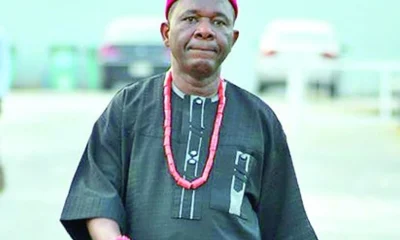Entertainment
Bob-Manuel Udokwu Debunks Pete Edochie Disrespect Reports

In a compelling clarification that seeks to mend a rift manufactured by a viral headline, Nollywood actor and politician Bob-Manuel Udokwu has publicly debunked reports suggesting he accused his senior colleague, the legendary Pete Edochie, of deceiving the public. Speaking candidly in a recent interview, Udokwu stressed that his comments were grossly misrepresented, and he never made any derogatory remarks about an actor he considers a revered elder. The controversy highlights a fascinating and often misunderstood aspect of the Nigerian film industry’s history—the distinction between the pre-Nollywood “Golden Age” of cinema and the video film revolution that birthed what we now know as Nollywood.
The core of the misunderstanding, according to Udokwu, stems from his attempt to provide a historical timeline during a podcast. While he acknowledged the public’s perception of Pete Edochie as a trailblazer, he made a nuanced point about the technical beginnings of the video film era. “The line that I said Pete Edochie is parading himself and deceiving others never came from me. That was a complete misrepresentation,” Udokwu stated, emphasizing that such a remark would be deeply disrespectful and culturally inappropriate. He clarified that his actual point was that he began his acting career in the modern Nollywood era before Edochie, but without ever discrediting the legendary actor’s monumental achievements that preceded it.
For the average film enthusiast, the term “Nollywood” can be a catch-all for all Nigerian cinema. However, its widely accepted official beginning is often traced to the 1992 film `Living in Bondage`. This iconic work, a straight-to-video production, revolutionized the industry by creating a low-cost, high-output model that would eventually make Nigeria the second-largest film producer in the world. This is the era into which Bob-Manuel Udokwu stepped. His early roles in productions like the hugely popular television soap opera `Checkmate` and, most notably, `Living in Bondage` itself, place him at the very inception of this new industry. His career is intrinsically linked to the video film boom that truly defined “Nollywood” as a distinct entity.
In contrast, Pete Edochie’s most iconic and career-defining role as Okonkwo in the television series adaptation of Chinua Achebe’s novel, `Things Fall Apart`, was produced by the Nigerian Television Authority (NTA) in 1987. While a groundbreaking and internationally acclaimed work that cemented Edochie’s place as a cultural icon, it was a celluloid production that predated the video film revolution by five years. This crucial historical detail is what Udokwu was alluding to. He was not challenging Edochie’s status as a veteran, but rather distinguishing between the golden age of television and film, where Edochie reigned supreme, and the video film industry that later emerged and became known as Nollywood.
The controversy underscores the dangers of media sensationalism and the public’s eagerness to consume narratives of conflict. Udokwu, who has consistently demonstrated a deep reverence for his elders, was quick to address the issue. As the Special Adviser on Entertainment, Leisure and Tourism to Anambra State Governor Charles Soludo, his words carry an extra layer of weight, and he is keenly aware of the need to maintain a positive public image. He has previously served in similar roles under Governor Peter Obi and Governor Willie Obiano, a testament to his commitment to public service and his continued relevance in both the entertainment and political spheres. His immediate and heartfelt clarification on the matter speaks volumes about the value of respect and honor that he, and indeed African culture as a whole, places on senior figures.
Udokwu’s swift action to clear the air serves as a powerful reminder that while the entertainment world is often driven by drama, the bonds between its pioneers are often forged in mutual respect and admiration. Both Bob-Manuel Udokwu and Pete Edochie have contributed immensely to the rich tapestry of Nigerian storytelling. They represent two distinct, yet interconnected, chapters in the evolution of the country’s creative industries. As the dust settles on this manufactured controversy, the shared history of these two legends remains a testament to their individual contributions and their collective impact on African cinema.


